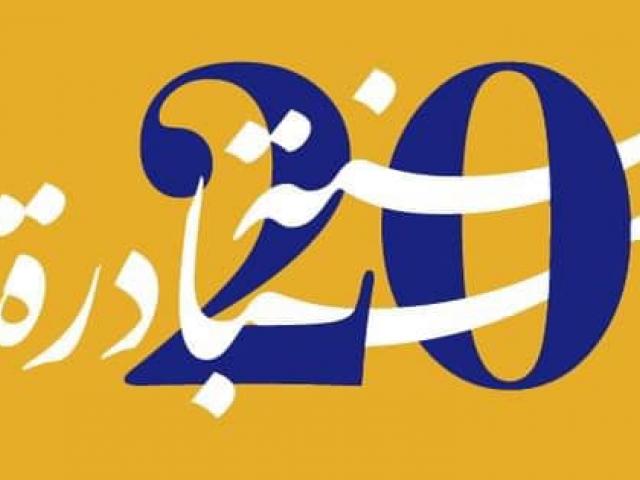
EIPR in 2022
Press Release
Dear friends of the Egyptian Initiative for Personal Rights
With the end of 2022 and at the beginning of a new year, we would like to extend our deep thanks to you for your support throughout the year and over the past twenty years, since EIPR was launched in the summer of 2002.
We also wanted to take this opportunity to remind you of the most important activities and efforts that our team has engaged in, including research work, legal assistance and advocacy campaigns in all our different work files.
In the criminal justice file, EIPR lawyers succeeded throughout the year in releasing about 61 political prisoners who faced accusations without evidence in the framework of the continuous violation of freedoms of opinion, expression and political participation, or who were victims of random arbitrary arrests or unfair trials. We issued a special report entitled "Conviction Without Evidence: The Unfair Trial of Aboul Fotouh, Al-Qasas, and Moaz Al-Sharqawi", an article on the social and economic cost of the prison system in Egypt, and a short film entitled "After the verdict against Alaa, Baqer and Oxygen...the ball is in the president's court," in addition to our monthly monitor of death sentences issued by Egyptian courts and executions in prisons. With the re-formation and activation of the Presidential Pardon Committee, we launched with other human rights organizations a comprehensive proposal with criteria for the release of all political prisoners in Egypt. We submitted to the Committee the files of more than three thousand male and female prisoners who deserve pardon and freedom, and we documented hundreds of new cases of political detention. Our lawyers obtained three acquittals for defendants facing trial on political charges, and several rulings to erase the names of former political prisoners from criminal records.
Regarding freedom of religion and belief, we issued a report on religious freedoms in Egypt, entitled "Selective Improvement in the Face of a Legislative and Executive Structure that Enables Discrimination", a research paper that discussed how the preparatory works for Egyptian constitutions dealt with issues of freedom of religion and belief, and another on the roots of the term "heavenly religions" in Islamic heritage and Renaissance discourse, as well as a short film entitled "Ignoring the Dead: Where Have the Graves of Adherents of Unrecognized Religions Gone?". Our lawyers represented victims of sectarian violence in the city of Abu Qurqas in Minya in a criminal trial that ended in September with the conviction of the perpetrators of murder, arson and exhumation of graves against the city’s Copts in the summer of 2013. We also provided legal defense to a number of defendants accused of blasphemy for their peaceful expression of opinions or ideas deemed offensive to Islam.
With regard to women's rights and gender issues, we issued a report entitled "Female Share: Inheritance Equality of Egyptian Christian Women", a paper advocating vaccine access for HPV, and an article entitled "Mokka Higazi: A Victim Tried Twice". Our lawyers obtained a judgment convicting the perpetrators of sexual assault against a female child in Kerdasa, Giza, and another conviction for defaming a female victim of group sexual harassment in Mit Ghamr, Dakahlia. They also continued to provide legal defense for defendants who were arrested on the grounds of their sexual orientation and obtained acquittals in three trials that took place in the Fifth Settlement and Qasr al-Nil in Cairo and Faraskour in Sharkia.
In the file of economic justice, we published a study on the protection of vulnerable workers in Egypt during crises, and research on the continued sinking of Egypt in the trap of foreign debt and its effects on the social and economic rights of Egyptians, entitled "Six years of IMF: A treatment that exacerbates the disease”.
On the right to health, our publications dealt with real estimates of deaths from the COVID-19 pandemic in Egypt, and an analysis of the new executive regulations of the law regulating clinical trials. Our lawyers obtained a ruling from the State’s Council that entitles a girl to free treatment for a rare congenital disease at the expense of the Health Insurance Authority until her full recovery.
Environmental justice captured a large part of our attention this year, with Egypt's hosting and presidency of the United Nations climate summit (COP27). Our publications included a position paper on policies to confront climate change in Egypt, a study on the impact of climate change on the health of Egyptians, a paper on the disappearance of green spaces and trees in Egyptian cities, a commentary on the strengths, shortcomings and development prospects of the new waste management law regulations, and an article on the social impact of air pollution in Egypt. The World Bank Group's investigations into a complaint submitted by EIPR on behalf of the residents of Wadi Al-Qamar in Alexandria resulted in a report from the bank which recognized numerous violations against the residents of the region caused by the Titan Cement Factory funded by the Bank. Our lawyers obtained a final ruling from the Court of Cassation compensating that community for the health damages caused by the factory's use of coal. We participated in the establishment of the COP27 Global Coalition to demand environmental and climate justice, and the coalition of Egyptian human rights organizations regarding the climate summit, in addition to our active participation in the summit in November in Sharm El-Sheikh.
We wish you a happy new year, and see you in 2023!
The Egyptian Initiative for Personal Rights team



